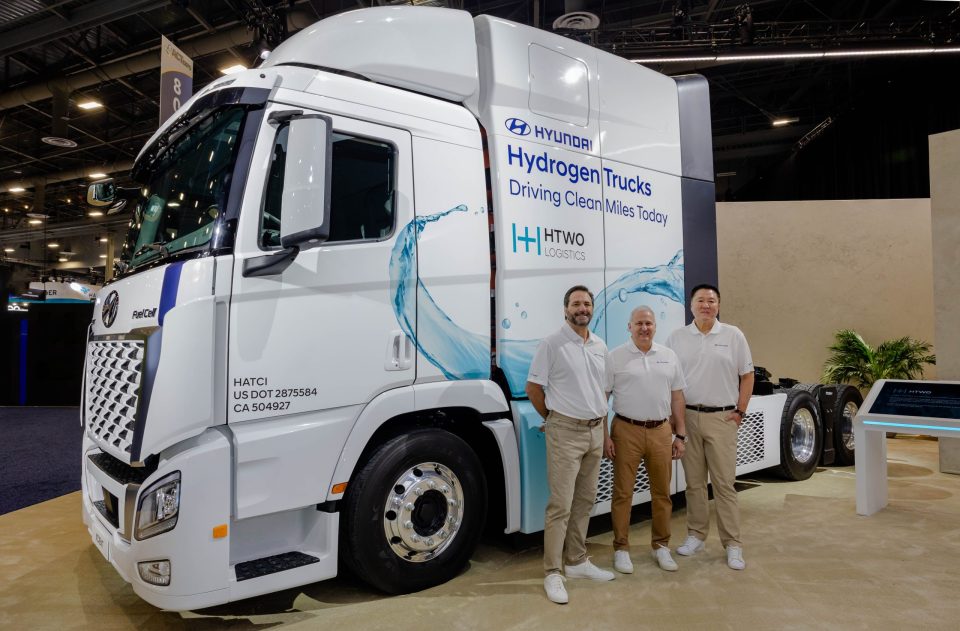
Buckle up, because the future of trucking is arriving ahead of schedule, and it's a collaboration built on clean energy and cutting-edge technology. Hyundai and Plus, two industry leaders, have joined forces to unveil the first-ever Level 4 autonomous hydrogen fuel cell truck in the United States. This isn't just a fancy prototype; it's a glimpse into a transportation landscape that's poised to be safer, more efficient, and significantly greener.

A Powerful Partnership for Progress
Hyundai, a global automotive giant known for its commitment to sustainable transportation, brings its expertise in hydrogen fuel cell technology to the table. Plus, a leader in autonomous driving software, contributes its industry-leading SuperDrive™ system. This powerful duo is setting a new standard for innovation in the trucking industry.
The XCIENT Fuel Cell Truck: A Technological Marvel
Imagine an 18-wheeler that glides down the highway, free of human error and powered by clean-burning hydrogen. That's the reality of the Hyundai XCIENT Fuel Cell truck. This Class 8 powerhouse has already proven its mettle in commercial operations around the world. Now, equipped with Plus's SuperDrive™, it's taking a groundbreaking leap into the realm of autonomous driving.

>> In Other News: [x](x)
The Magic Behind the Machine
Let's delve into the technology that makes this innovation possible. Hydrogen fuel cell technology offers a clean alternative to traditional diesel engines. The truck generates electricity through a chemical reaction between hydrogen and oxygen, producing nothing but water vapor as a byproduct. Plus's SuperDrive™ system acts as the truck's digital brain. Using a suite of high-tech sensors, including LiDAR, radar, and cameras, the system perceives its surroundings, plans its route, and anticipates potential hazards, all with the goal of safe and efficient autonomous operation.
A Future Filled with Benefits
The potential impact of this collaboration is nothing short of revolutionary. Here are some of the ways it could transform the trucking industry and beyond:
Enhanced Safety: Human error is a major contributor to road accidents. Autonomous trucks have the potential to significantly reduce collisions, creating a safer environment for everyone on the road.
Environmental Champion: By eliminating tailpipe emissions, hydrogen fuel cell trucks can drastically cut down on air pollution and contribute to global efforts to combat climate change.
Efficiency Powerhouse: Autonomous trucks can optimize routes and maintain consistent speeds, leading to improved fuel efficiency and reduced operating costs for logistics companies.
Shaping the Road Ahead
The implications of this partnership extend far beyond the trucking industry. It has the potential to influence industry standards and regulations, paving the way for wider adoption of autonomous and hydrogen-powered vehicles. Public perception and market readiness will also play a crucial role. However, with successful demonstrations like this one, public trust and industry acceptance are sure to follow.
Hyundai and Plus are not resting on their laurels. They have ambitious plans for future developments and scaling up this technology for wider adoption. This collaboration is a beacon of hope, not just for the trucking industry, but for the future of transportation as a whole. It's a testament to the power of human ingenuity and a glimpse into a cleaner, safer, and more efficient transportation landscape on the horizon. The road ahead may be paved with challenges, but with continued collaboration and innovation, the future of autonomous hydrogen fuel cell trucks is bright.
Subscribe to the newsletter
Daily decarbonization data and news delivered to your inbox
Follow the money flow of climate, technology, and energy investments to uncover new opportunities and jobs.
Latest issues
-
Inside America’s Carbon Capture Reality Check
Inside This Issue ⚡ Duke Energy Florida Goes Live With First 100% Hydrogen System ✈️ Air bp Signs Agreement With Airbus on Flight Services and Fuel Supplies in Europe 🌊 Pairing Reefs and Mangroves...
-
Three Nebraska Plants Prove Ethanol CCS Actually Works
Inside this Issue 🌽 Three Nebraska Plants Prove Ethanol CCS Actually Works ☀️ SunHydrogen and CTF Solar Sign Agreement to Accelerate Hydrogen Panel Manufacturing 🧪 GenH2 Completes Major Milestone:...
-
DOE Doubles Down on $1/kg Clean Hydrogen Goal
Inside This Issue 🎯 Doe Doubles Down on $1/kg Clean Hydrogen Goal 🕳️ Quebec Introduces First Legal Framework for Underground CO2 Storage 🧪 Charbone Announces Its First Hydrogen Supply Hub in the O...
Company Announcements
-
JERA Announces Close of Haynesville Shale Gas Asset in Louisiana
TOKYO and HOUSTON, Feb. 12, 2026 /PRNewswire/ -- JERA Co. Inc., a global energy leader and Japan's largest power generation company, today announced that through its subsidiary JERA Americas Inc., ...
-
Buffalo Biodiesel Inc. (“BBD”), a leading recycler of waste vegetable used cooking oil (WVUCO) and producer of renewable feedstocks, announced that they have officially renewed a Part 364 Waste Tra...
-
Air bp Signs Agreement With Airbus on Flight Services and Fuel Supplies in Europe
Air bp has signed a multi-year contract with Airbus for the supply of conventional aviation fuel, sustainable aviation fuel (SAF), and related services in Germany and Spain. This agreement enables ...
-
BEND, Ore.--Element 1® Corp. (“e1”), an Oregon-based leader in methanol-to-hydrogen generation technology, today announced the signing of a Memorandum of Understanding (MOU) with Aurosi Precision C...